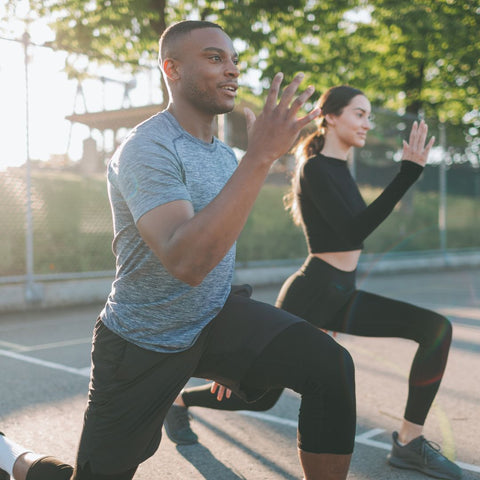We've spoken about diets and fads a lot recently, Mostly, we've spoken about how these diets and fads can be incredibly dangerous, especially if they're not completed correctly. We've even spoken about calorie deficits and how a good calorie deficit is the number one way to lose weight. But how about exercise?
Or more specifically, what has a bigger role in helping you lose weight, exercise or diet?
We will let you in a little secret.
Most people will tell you that exercise and exercise alone can help you lose weight. But here's the thing. If your nutrition is out of whack, no amount of exercise will make a difference. Excessive exercise with poor nutrition may, in fact, contribute to the illusion of weight gain as the body will build muscle underneath the fat.
So, the only real way to lose weight and keep it off is to focus on a good nutritious diet that doesn't blow your calorie intake off the charts. Yes, before you tell us, we know that exercise burns calories. But, you would have to be doing high-intensity exercise, burning 400-500 calories a session every day, to see a remarkable difference. Plus, you would need to ensure that this excess exercise isn't compelling you to eat larger portions, as it usually would.
The answer is in the calories
As we answered in our previous blog, How To Lose Weight Healthily, finding a suitable calorie deficit is the only real way to shed weight and see a noticeable difference. The reason that many people believe they are seeing quick results with exercise, is usually due to physical changes. For example, building muscle on your back will ultimately help it feel tighter, which creates the illusion of a slimmer appearance.
Now, that's not to say that you shouldn't exercise. Exercise has many benefits that can assist your weight loss. For example, some studies show that it can increase your metabolism's performance. This can assist in how quickly your body can burn fat and absorb healthy nutrients.
So, why are we saying that exercise won't help?
Well, if you are still eating processed, unhealthy foods and a nutritionally-poor diet, no amount of good metabolism will help break down food. In fact, most of this food will quickly turn to fat as it has little-to-no nutritional value. So, where a serving of spinach could provide you with energy and good digestion for days, a serving of greasy pizza (as good as it sounds), will not be converted to energy, and rather, will store itself as fat quite quickly.

But what does this have to do with a calorie deficit?
We know what you're thinking. A calorie deficit essentially means you can eat anything you want to without any problems. Right?
While this is essentially true, you do need to be careful. A low-calorie dinner, such as some chicken and veggies, will only take up around one-third of your required calories for the day. On the other hand, a large meal at a takeaway restaurant with a soft drink on the side can account for almost all, if not more of your day's calories. Needless to say, you probably feel hungry again not long after due to the poor nutritional value of the meal. So, it's not unlikely that you will eat again. By the time you've consumed three meals, you may have doubled your calories from your daily recommended amount.
Though you may think, 'I'll work it off in the gym later,' the average 30-minute run burns around 238 calories. So, if you are well over your calories for the day, you are likely going to need to spend a whole lot longer working out to bring yourself back into a deficit.
Here's an analogy
Some people find it difficult to understand calories and calorie deficits. And that's okay! But you don't need to be an expert on macros to work it out. Think of it like money. Every week, fortnight or month, you will get paid for your job. This comes in a lump sum. This is like eating. When you eat a meal, you instantly put a lump sum of calories into your body.
Then, during the week, with your money, you may spend a portion of it on rent, groceries and other goods. Regardless, you are unlikely to spend it all at once (unless you're making a big purchase). So, there is always something left over. This is the same with burning calories. While we would like to lose them all in one hit, they slowly burn throughout our daily activities, and we will rarely lose more than we gain, no matter how hard we try.

Eating nutritionally dense foods is key
Nutritionally dense foods, like our Nutritional Lattes and Superfood Breakfast Bowls, are often low in GI. This means they will fill you up for longer and help you reach your calories or achieve a deficit. When pairing this deficit with exercise, you will see a difference. However, until then, it's important to remember that a good diet will always take precedence over a good exercise routine.

